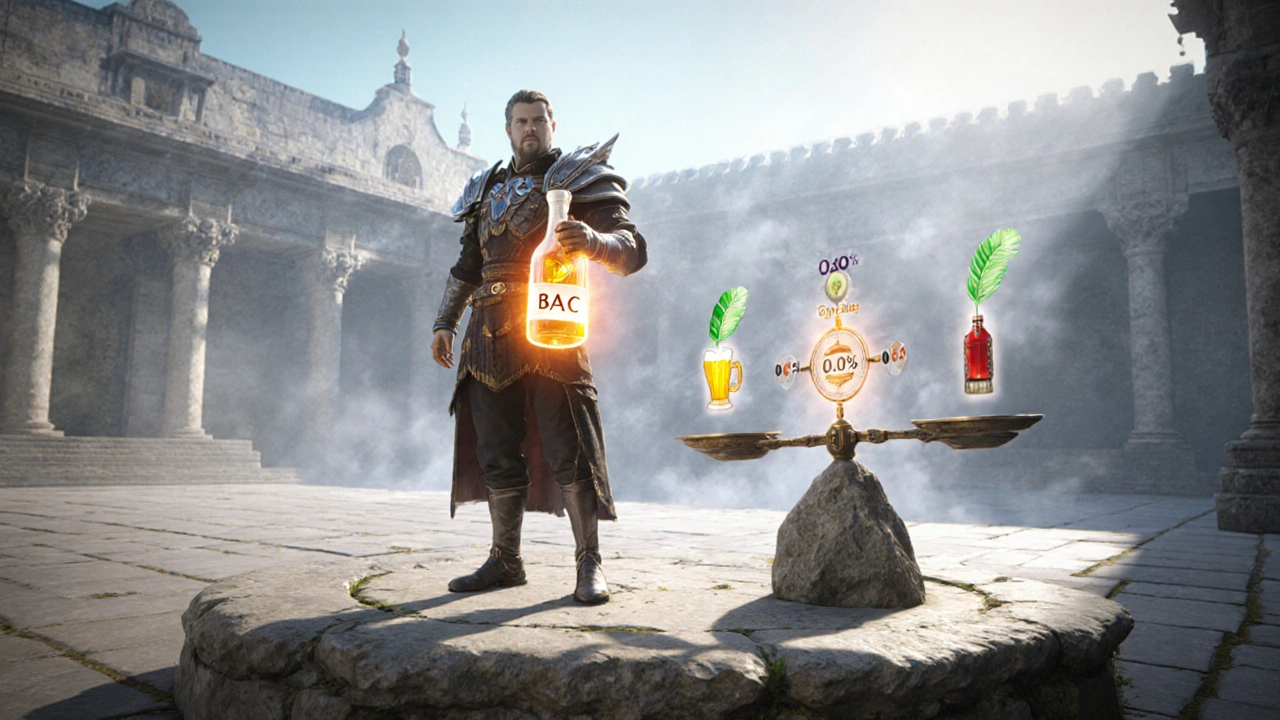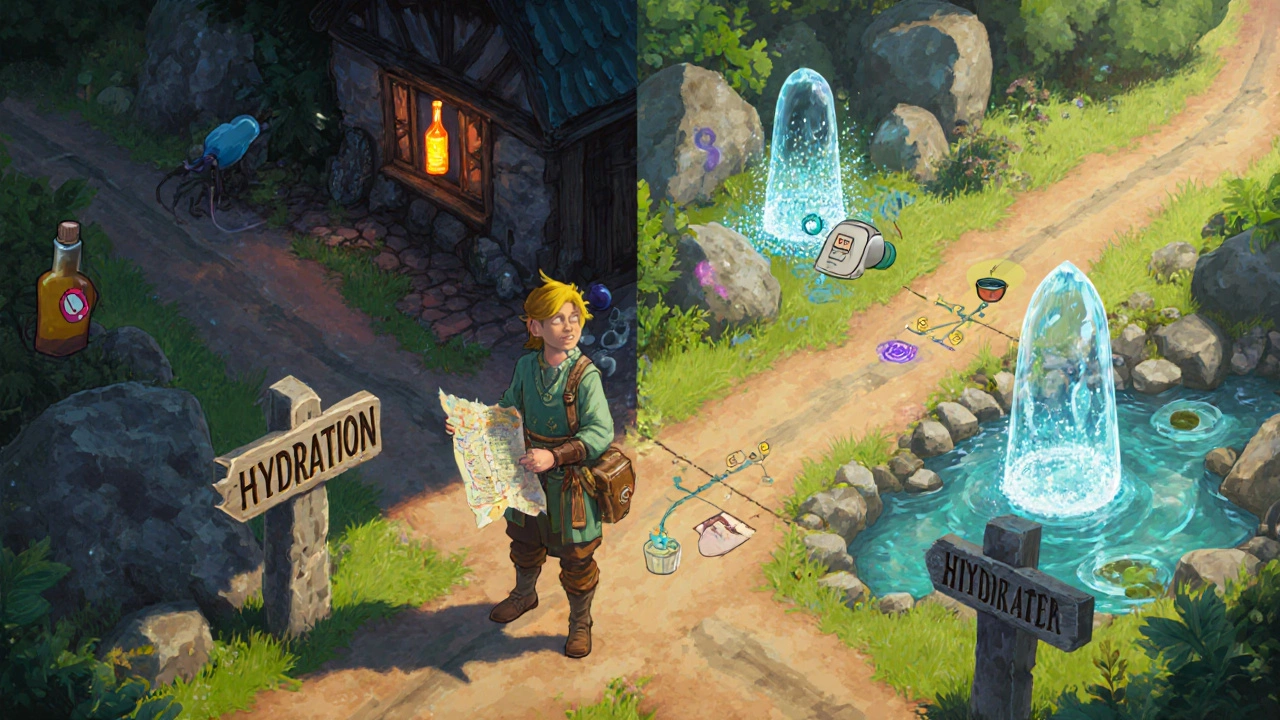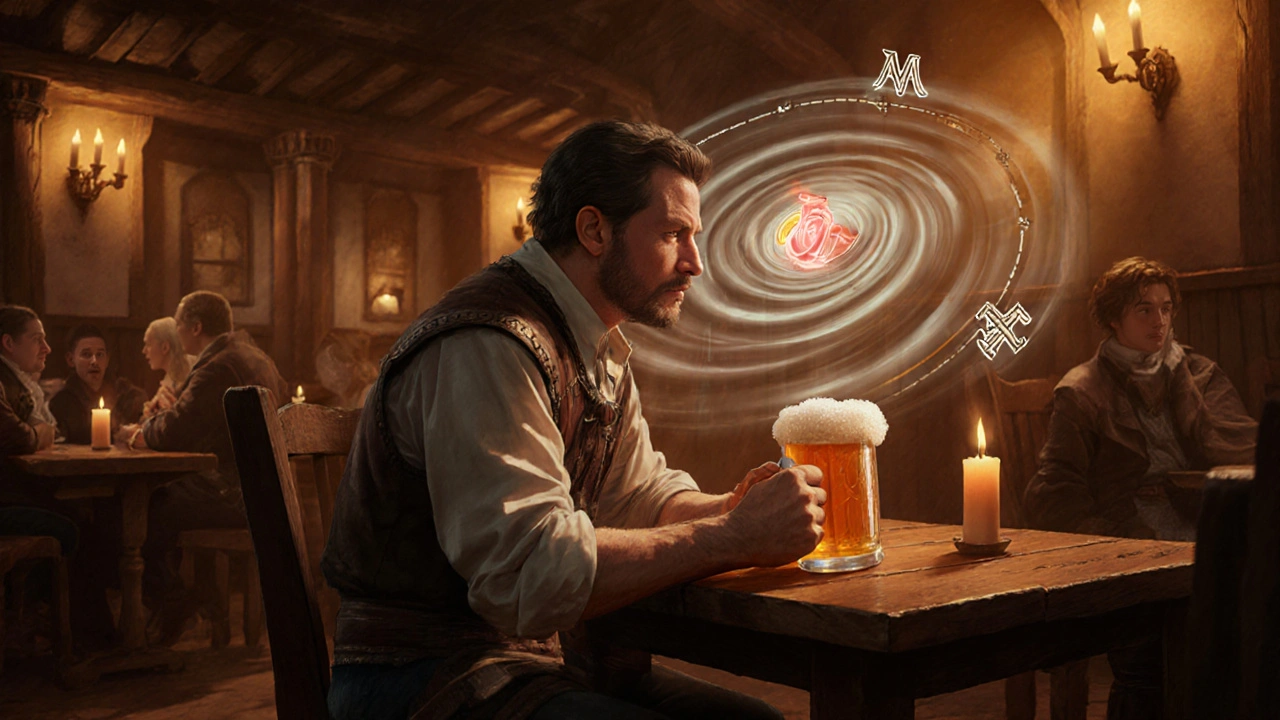Alcohol Dizziness Risk Calculator
Key Insights
Key Takeaways
- Alcohol can disrupt the vestibular system, leading to true dizziness or a feeling of light‑headedness.
- Even modest drinking raises blood alcohol concentration (BAC) enough to affect balance for many people.
- Dehydration, low blood pressure, and medication interactions amplify alcohol‑related dizziness.
- Knowing your personal risk factors helps you decide when to skip the drink.
- If dizziness persists after you’ve stopped drinking, it’s time to see a clinician.
Ever felt that sudden woozy spin after a few drinks and wondered if you should just avoid alcohol altogether? That uneasy sensation isn’t just a hangover‑side effect; it’s a signal from your body’s balance system. Below we break down exactly how alcohol and dizziness are connected, when the risk spikes, and practical steps you can take.
Alcohol is a psychoactive substance that depresses the central nervous system. When consumed, it enters the bloodstream and propagates to organs that control coordination, eye movements, and blood pressure. The degree of impact depends on the amount, drinking speed, and individual physiology.
Dizziness is a broad term that covers vertigo (a spinning sensation), light‑headedness, and general unsteadiness. It often originates from the vestibular system in the inner ear, but can also stem from blood‑sugar dips, low blood pressure, or medication side effects.
How Alcohol Messes with Your Balance
The brain’s ability to interpret motion relies on three inputs: visual cues, proprioception (body sense), and the vestibular system. Alcohol interferes with each of these:
- Vestibular suppression - Alcohol reduces the firing rate of hair cells in the inner ear, blunting the signal that tells your brain you’re upright.
- Visual distortion - Pupillary dilation and delayed visual processing make it harder to track surroundings, worsening the sense of sway.
- Proprioceptive lag - Muscle spindles fire slower, so you misjudge the position of your limbs.
Combined, these effects can produce the classic “drunk wobble” and, in heavier doses, a true vertigo feeling.
Blood Alcohol Concentration (BAC) Matters
Blood Alcohol Concentration (BAC) measures the grams of alcohol per 100mL of blood. In Canada, legal driving limits sit at 0.08% (80mg/dL). Research shows that even a BAC of 0.02% (20mg/dL) can impair balance tests such as the Romberg or tandem walk, especially in people over 50.
Key points:
- 0.01‑0.02% - Slight tremor, reduced coordination.
- 0.04‑0.06% - Noticeable sway, difficulty standing with eyes closed.
- ≥0.08% - Marked unsteadiness, risk of falls.
If you experience dizziness at lower BACs, you likely have additional risk factors.

Key Lifestyle Factors That Amplify the Effect
Not everyone reacts the same way to the same amount of alcohol. Below are the most common amplifiers:
Dehydration is a frequent companion of drinking because alcohol is a diuretic. Less fluid means lower blood volume, which in turn drops blood pressure and reduces oxygen delivery to the brain - both trigger light‑headedness.
Hypotension (low blood pressure) can be caused by alcohol’s vasodilating effect. When vessels relax, blood pools in the lower extremities, leaving the brain starved for blood when you stand up.
Medication Interaction - Many prescription and over‑the‑counter drugs, such as antihypertensives, benzodiazepines, and certain antibiotics, intensify alcohol’s sedative properties, magnifying dizziness.
The Inner Ear itself can be compromised by chronic heavy drinking, leading to long‑term vestibular dysfunction. This is why some people report persistent imbalance even after they quit.
When Should You Consider Cutting Out Alcohol?
Below is a practical decision‑tree you can run mentally before reaching for that next drink:
- Do you have any of the amplifiers listed above? If yes, aim for low‑alcohol or alcohol‑free options.
- Do you experience dizziness after just one or two drinks? That’s a sign of heightened sensitivity - consider abstaining.
- Are you on medications that interact with alcohol? Consult your prescriber; many recommend complete avoidance.
- Do you have a history of falls or vestibular disorders? The safest route is to avoid alcohol altogether.
If you answer “yes” to any of these, swapping alcohol for sparkling water, herbal tea, or a low‑sugar mocktail can preserve social enjoyment without the risk.
Comparing Drinking Patterns and Dizziness Risk
| Pattern | Typical BAC | Average Dizziness Rating (1‑5) | Notes |
|---|---|---|---|
| Social sip (1‑2 drinks/week) | 0.01‑0.02% | 1 | Low risk for most adults. |
| Weekend binge (5‑6 drinks in 2hrs) | 0.06‑0.09% | 3‑4 | Significant balance disturbance; higher fall risk. |
| Daily moderate (2 drinks/day) | 0.03‑0.04% | 2 | May cause chronic vestibular fatigue. |
| Heavy chronic (>10 drinks/week) | ≥0.05% | 4‑5 | Long‑term inner‑ear damage possible. |
These numbers are averages; personal tolerance varies. Use the table as a quick reference when planning evenings out.

Practical Tips to Reduce Dizziness When You Drink
- Hydrate first: Drink a full glass of water before any alcoholic beverage.
- Eat protein‑rich foods: Fat and protein slow alcohol absorption, keeping BAC lower.
- Choose lower‑proof drinks: Beer or wine (≈5‑12% ABV) produce lower peaks than spirits.
- Pace yourself: Aim for one standard drink per hour; set a timer if needed.
- Stand up slowly: Give your circulatory system time to adjust, cutting down orthostatic dizziness.
- Know your meds: Keep a list of prescriptions and ask a pharmacist about alcohol interactions.
When Dizziness Signals a Medical Issue
If you notice any of the following, seek professional help promptly:
- Sudden, severe vertigo lasting more than a few minutes.
- Persistent dizziness days after you stopped drinking.
- Associated symptoms like hearing loss, ringing in the ears (tinnitus), or facial weakness.
- Fainting spells (syncope) or irregular heartbeat.
These could point to vestibular neuritis, Menière’s disease, or cardiovascular problems that need targeted treatment.
Bottom Line
Alcohol is a clear trigger for dizziness for many people, especially when combined with dehydration, low blood pressure, or certain medications. Understanding your personal risk factors and watching your BAC can let you enjoy a drink without the spin. When in doubt, swapping for a non‑alcoholic option or cutting back altogether is the safest play.
Frequently Asked Questions
Can a single glass of wine cause dizziness?
For most healthy adults, one 5oz glass (≈12% ABV) yields a BAC under 0.01%, which rarely causes noticeable dizziness. However, if you’re dehydrated, on blood‑pressure meds, or have a vestibular disorder, even that small amount can tip you into light‑headedness.
Why does alcohol make me feel dizzy when I stand up quickly?
Alcohol dilates blood vessels and promotes urine production, lowering overall blood volume. When you stand, gravity pulls blood to your legs; with reduced volume, the brain gets less oxygen briefly, causing orthostatic dizziness.
Is it safe to mix alcohol with antihistamines?
Mixing the two is generally discouraged. Antihistamines already cause drowsiness and can impair balance; alcohol adds another layer of CNS depression, dramatically increasing dizziness and fall risk.
How long does alcohol‑induced dizziness last?
Acute dizziness usually resolves as BAC falls below 0.02%, which can take 1‑3hours depending on gender, weight, and metabolism. Persistent symptoms beyond 24hours may indicate an underlying condition that needs evaluation.
Can chronic drinking cause permanent balance problems?
Long‑term heavy alcohol use can damage the cerebellum and inner‑ear hair cells, leading to lasting gait instability. Early intervention-reducing intake and seeking rehab-can halt or reverse many of these effects.

 Pharmacology
Pharmacology
Gary O'Connor
August 15, 2025 AT 01:56Dizzy after a couple beers? Yeah, that’s normal.
Justin Stanus
August 28, 2025 AT 23:16When you knock back drinks, alcohol turns you into a mild diuretic, so you lose fluids faster than you think. That loss of water drops your blood volume, which can make your brain feel light‑headed when you stand up. Pairing booze with meds that already lower blood pressure just amplifies the effect. Bottom line – stay hydrated and give your system a break between pours.
Jack Marsh
September 11, 2025 AT 20:36While popular media frequently links occasional alcohol consumption with transient dizziness, the empirical evidence suggests that the relationship is far more nuanced than is commonly presented. First, blood alcohol concentration (BAC) thresholds for measurable impairment vary significantly across individuals due to genetic polymorphisms affecting alcohol dehydrogenase activity. Second, the vestibular suppression attributed to ethanol is dose‑dependent, and sub‑threshold doses (BAC < 0.02 %) often produce no detectable deviation in standardized Romberg or tandem walk assessments. Third, epidemiological studies that control for confounding variables, such as concurrent medication use and baseline cardiovascular health, have shown that moderate drinking does not independently increase fall risk in otherwise healthy adults. Fourth, the mechanistic pathway involving vasodilation and orthostatic hypotension is contingent upon pre‑existing hypovolemia, which can be mitigated by adequate hydration. Fifth, the notion that a single glass of wine inevitably causes dizziness disregards the buffering capacity of gastric emptying, which can be modulated by meal composition. Sixth, experimental designs that fail to randomize participants across gender and weight categories inadvertently inflate effect sizes. Seventh, the subjective sensation of “light‑headedness” is frequently conflated with true vertigo, despite the former being a centrally mediated phenomenon rather than a peripheral vestibular disorder. Eighth, longitudinal data indicate that chronic heavy alcohol use may indeed lead to cerebellar degeneration, yet this pathology is not observed in occasional drinkers. Ninth, it is essential to differentiate acute BAC‑related balance impairment from chronic neurotoxicity, as the clinical management strategies differ markedly. Tenth, the recommendation to “cut back” should be calibrated against individual risk factors rather than applied as a blanket public health directive. Eleventh, clinicians ought to employ objective post‑uralic sway measurements rather than rely on self‑reported dizziness, which is prone to recall bias. Twelfth, the interplay between antihistamines and ethanol exemplifies a pharmacokinetic interaction that can exacerbate CNS depression, a point often omitted from lay explanations. Thirteenth, emerging research on the gut‑brain axis suggests that alcohol‑induced microbiome alterations may indirectly affect proprioceptive signaling. Fourteenth, policies that penalize moderate drinkers may inadvertently stigmatize a behavior that, when practiced responsibly, carries minimal risk. Finally, the prudent course for individuals who experience dizziness at low BAC levels is to seek a comprehensive medical evaluation to rule out underlying vestibular or cardiovascular disorders, rather than attributing the symptom solely to alcohol.
Terry Lim
September 25, 2025 AT 17:56Stop drinking like a rookie and own your balance; the wobble is a cheap excuse. If you can’t handle a couple of drinks, just skip them.
Cayla Orahood
October 9, 2025 AT 15:16The so‑called “official” studies are conveniently funded by the alcohol lobby, and they hide the fact that hidden neurotoxins in cheap spirits can “rewire” your inner ear without you ever noticing. Every time you feel that spin, think of the covert experiments they run on unsuspecting patrons. It isn’t just a harmless buzz – it’s a deliberate destabilization of the populace’s equilibrium. That’s why the “moderate drinking” narrative persists, to keep us all slightly off‑balance.
McKenna Baldock
October 23, 2025 AT 12:36From a phenomenological perspective, dizziness represents a mismatch between expected proprioceptive input and the actual sensory feedback altered by ethanol. If we view the body as an embodied mind, then alcohol briefly disrupts the embodied cognition loop, creating the sensation of unreality. Recognizing this can help individuals make mindful choices about consumption, aligning bodily health with intentional living.
Andy Williams
November 6, 2025 AT 08:56In pharmacokinetic terms, ethanol’s elimination rate is roughly 0.015 g/dL per hour, which means a BAC of 0.08 % will typically return to baseline after about five to six hours, assuming no additional intake.
Amelia Liani
November 20, 2025 AT 06:16That explanation really clarifies the timeline; it’s comforting to know the body does have a predictable recovery pattern. Still, for anyone who’s felt that sudden spin, it’s understandable to feel uneasy while the numbers tick down. Taking it slow and hydrating can make that waiting period much more tolerable.
shikha chandel
December 4, 2025 AT 03:36The reductionist view of alcohol‑induced vertigo ignores the ontological complexity of vestibular perception.
Zach Westfall
December 18, 2025 AT 00:56Surely the very act of drinking summons a cascade of neurochemical chaos that shatters any simplistic model the layman dares to propose
Pranesh Kuppusamy
December 31, 2025 AT 22:16One might argue that the epistemic humility required to assess alcohol’s impact on equilibrium demands both empirical rigor and an awareness of sociocultural narratives that shape our interpretation of dizziness. By integrating quantitative BAC metrics with qualitative accounts of personal experience, we arrive at a more holistic understanding that transcends reductionist dichotomies.